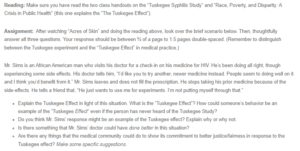The Tuskegee Effect
The “Tuskegee Effect” refers to a phenomenon that emerged from the infamous Tuskegee Syphilis Study, which was conducted by the United States Public Health Service (USPHS) between 1932 and 1972 in Tuskegee, Alabama (Munson & Lague, 2016b). The study’s main objective was to observe the natural progression of syphilis in African-American men. However, it is primarily known for its unethical and harmful aspects. Researchers involved in the study withheld effective treatment from the participants, did not obtain informed consent, and failed to inform the subjects about their diagnosis, all of which were significant ethical violations. The Tuskegee Effect, in a broader sense, refers to the lasting impact of this study on public trust in medical research, especially among minority communities. It has led to a profound mistrust of medical institutions, government health initiatives, and research among African Americans and other marginalized groups.
Notably, it is probable for someone to exhibit the Tuskegee Effect even if they have never heard of the Tuskegee Study. This is evident in Mr. Sims’s experience in the case study. This is because the legacy of the study has become deeply ingrained in the collective memory and cultural consciousness of marginalized communities, leading to a general mistrust of medical and research institutions. In addition, several other cases, like those covered in the Acres of Skin: The Documentary, are similar to the Tuskegee Syphilis Study (Cafry, 2012). As such, individuals may express distrust and reluctance based on this deep-seated historical memory, even without specific knowledge of the Tuskegee Study itself. I believe that Mr. Sims’ response resulted from the Tuskegee Effect because despite being sick and needing medication all his life, he chose to stop taking the medicine and risked dying from the illness. He deeply distrusts the medical institutions and thinks they will use him as a guinea pig for their medical trials.
In the case study scenario, Mr. Sims’ doctor could have done better by treating his patient respectfully and taking his reservations about new proposed interventions seriously. Suppose the doctor is not aware of said reservations; it would be a failure on their part as a doctor because cultural awareness and competence are crucial in this line of work. In addition, instead of briefly mentioning the new treatment, the doctor should have taken the time to educate his patient about it to secure his patient’s trust (Munson & Lague, 2016a).
The medical community can do several things to show their commitment to justice in response to the Tuskegee Effect. One of them would be implementing harsh policies to protect communities likely to be victims of such cases. Children are considered vulnerable members of society and therefore offered more protection services; the same case should apply to communities more vulnerable than others. Medical institutions should ensure that members of these marginalized communities are protected through every step while undergoing medical interventions.
References
Cafry, A. (2012). Acres of skin: The documentary [Video]. YouTube. https://www.youtube.com/watch?v=sfd1vCC3YC0
Munson, R., & Lague, I. (2016a). Chapter 10: Medicine in pluralistic society. In Intervention and Reflection: Basic Issues in Bioethics (10th ed., pp. 750–755). Cengage Learning.
Munson, R. & Lague, I. (2016b). Intervention and reflection: Basic issues in bioethics (10th ed.) Cengage Learning.
ORDER A PLAGIARISM-FREE PAPER HERE
We’ll write everything from scratch
Question
Reading: Make sure you have read the two class handouts on the “Tuskegee Syphilis Study” and “Race, Poverty, and Disparity: A Crisis in Public Health” (this one explains the “The Tuskegee Effect”).

The Tuskegee Effect
Assignment: After watching “Acres of Skin” and doing the reading above, look over the brief scenario below. Then, thoughtfully answer all three questions. Your response should be between ¾ of a page to 1.5 pages double-spaced. (Remember to distinguish between the Tuskegee experiment and the “Tuskegee Effect” in medical practice.)
Mr. Sims is an African American man who visits his doctor for a check-in on his medicine for HIV. He’s been doing all right, though experiencing some side effects. His doctor tells him, “I’d like you to try another, newer medicine instead. People seem to doing well on it and I think you’d benefit from it.” Mr. Sims leaves and does not fill the prescription. He stops taking his prior medicine because of the side-effects. He tells a friend that, “He just wants to use me for experiments. I’m not putting myself through that.”
- Explain the Tuskegee Effect in light of this situation. What is the “Tuskegee Effect”? How could someone’s behavior be an example of the “Tuskegee Effect” even if the person has never heard of the Tuskegee Study?
- Do you think Mr. Sims’ response might be an example of the Tuskegee effect? Explain why or why not.
- Is there something that Mr. Sims’ doctor could have done better in this situation?
- Are there any things that the medical community could do to show its commitment to better justice/fairness in response to the Tuskegee effect? Make some specific suggestions.

